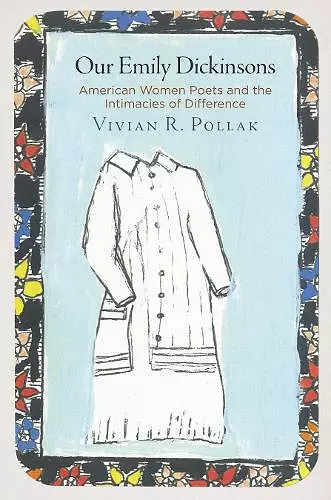Our Emily Dickinsons
American Women Poets and the Intimacies of Difference
Format:Hardback
Publisher:University of Pennsylvania Press
Published:2nd Dec '16
Currently unavailable, and unfortunately no date known when it will be back

Our Emily Dickinsons situates Dickinson's life and work within larger debates about gender, sexuality, and literary authority in America. Examining Dickinson's influence on Marianne Moore, Sylvia Plath, Elizabeth Bishop and others, Vivian R. Pollak complicates the connection between authorial biography and poetry that endures.
For Vivian R. Pollak, Emily Dickinson's work is an extended meditation on the risks of social, psychological, and aesthetic difference that would be taken up by the generations of women poets who followed her. She situates Dickinson's originality in relation to her nineteenth-century audiences, including poet, novelist, and Indian rights activist Helen Hunt Jackson and her controversial first editor, Mabel Loomis Todd, and traces the emergence of competing versions of a brilliant but troubled Dickinson in the twentieth century, especially in the writings of Marianne Moore, Sylvia Plath, and Elizabeth Bishop.
Pollak reveals the wide range of emotions exhibited by women poets toward Dickinson's achievement and chronicles how their attitudes toward her changed over time. She contends, however, that they consistently use Dickinson to clarify personal and professional battles of their own. Reading poems, letters, diaries, journals, interviews, drafts of published and unpublished work, and other historically specific primary sources, Pollak tracks nineteenth- and twentieth-century women poets' ambivalence toward a literary tradition that overvalued lyric's inwardness and undervalued the power of social connection.
Our Emily Dickinsons places Dickinson's life and work within the context of larger debates about gender, sexuality, and literary authority in America and complicates the connections between creative expression, authorial biography, audience reception, and literary genealogy.
"Persistently witty and insightful, the book feeds and satisfies one's curiosity. Much like the poetic texts it plays against, it invites the reader to slow down, to reread, to enjoy a subtlety, to share an intimacy. This is not simply a scholarly study but a work of art about prior works of art and about the creative personalities that engendered them . . . Scholarly books come and go, and it is generally good that they do so. This book, however, may be around for a long time-as an inspiration for subsequent scholarship; an influential account of the afterlife of Dickinson; and a stimulating study of the works and lives of Jackson, Todd, Moore, Plath, and Bishop. It is a book to read and absorb, one that beautifully evokes the dramas of creativity unfolding in some of Dickinson's most notable inheritors." * Modern Language Quarterly *
"Pollak beautifully analyses the changing attitude of women poets whose psychological connections to and disconnections from Dickinson take place through the practices of reading . . . Our Emily Dickinsons marks the historical and cultural place that Dickinson has occupied in the American consciousness through a skilful weaving: of biography with poetry; diary and journal entries with literary reviews; and newspaper advertisements with personal letters." * Modern Language Review *
"Vivian R. Pollak provides an entirely original, subtle, and insightful reading of the gender anxieties of women poets as revealed through their responses to reading Dickinson and each other, or sometimes through their sense of Dickinson as the inevitable point of comparison. Pollak contributes a plethora of information previously unknown or not widely known about the relationships between the later poets she studies and between those women and Dickinson, and she offers astute readings of their often nuanced comments on Dickinson (and each other) in reviews, letters, diaries, or published prose. There is no other book like it!" * Cristanne Miller, University of Buffalo *
"Vivian Pollak's ingenious look at Emily Dickinson's hold on the imagination of three late modernist poets (Marianne Moore, Elizabeth Bishop, and Sylvia Plath) is stunning in its revelations and riveting in its analysis of how the ever-mysterious Queen of Calvary works her magic differently on each poet and on each new generation of readers. This book is brilliant. I finished it and, captivated, turned back to page one and began again." * Mary Jo Bang, Washington University in St. Louis *
"Elegantly written, witty, and consistently illuminating in its readings, Vivian Pollak's book represents feminist literary criticism at its best. In luminous detail, the book reveals the ways American women poets have engaged their own gendered anxieties and fears through their intimate encounters with Emily Dickinson." * Betsy Erkkilä, Northwestern University *
ISBN: 9780812248449
Dimensions: unknown
Weight: unknown
368 pages